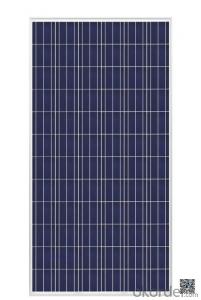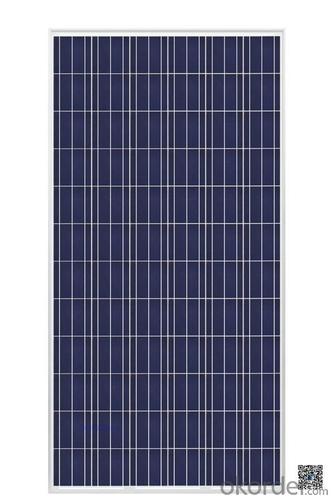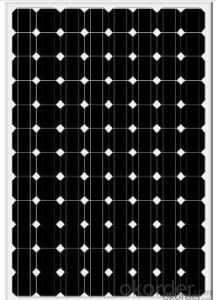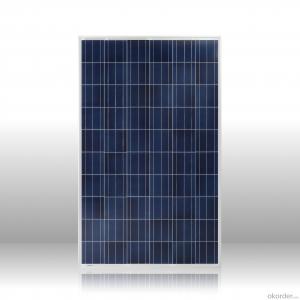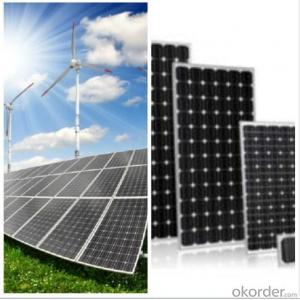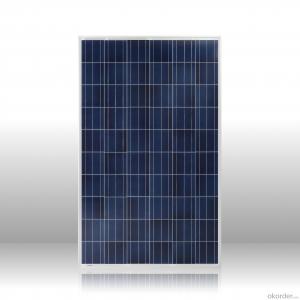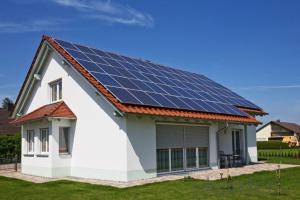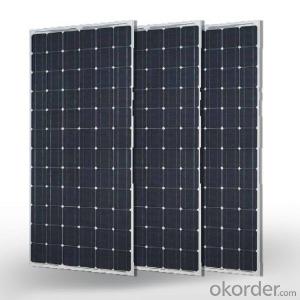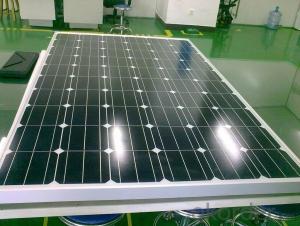Chase Solar Panels 250W High Efficiency Solar Panel Poly
- Loading Port:
- Shanghai
- Payment Terms:
- TT OR LC
- Min Order Qty:
- 2600 watt
- Supply Capability:
- 26000 watt/month
OKorder Service Pledge
OKorder Financial Service
You Might Also Like
Specification
Features of our products:
• High conversion efficiency mono/poly-crystalline amorphous silicon solar cells
• Modules incorporate high performance bypass diodes to minimize the power drop caused by shading
• High transmittance, low-iron tempered glass
• High performance EVA encapsulant to prevent destroying and water.
• AI frame: without screw, corner connection. 8 holes on the frame can be installed easily
• Good performance of preventing from atrocious weather such as wind and hails
Polycrystalline Silicon Solar Modules 48Cell-195W Specification
ELECTRICAL PERFORMANCE | |||
Power output | P max | W | 195 |
Power output tolerances | ΔP max | W | 0/+5 |
Module effi ciency | η m | % | 14.7 |
Voltage at Pmax | V mpp | V | 23.7 |
Current at Pmax | I mpp | A | 8.03 |
Open-circuit voltage | V oc | V | 30.1 |
Short-circuit current | I sc | A | 8.65 |
Product Description:
This installation Manual contains essential information for the electrical and mechanical installation that your must know before installing CUSTOMER PV modules. This also contains safety information you need to be familiar with .
CUSTOMER does not assume responsibility and expressly disclaims liability for loss, damage, or expense arising out of in anyway connected with installation, operation, use or maintenance of the PV modules. No responsibility is assumed by CUSTOMER for any infringement of patents or other rights of third parties that may result from use of PV module.
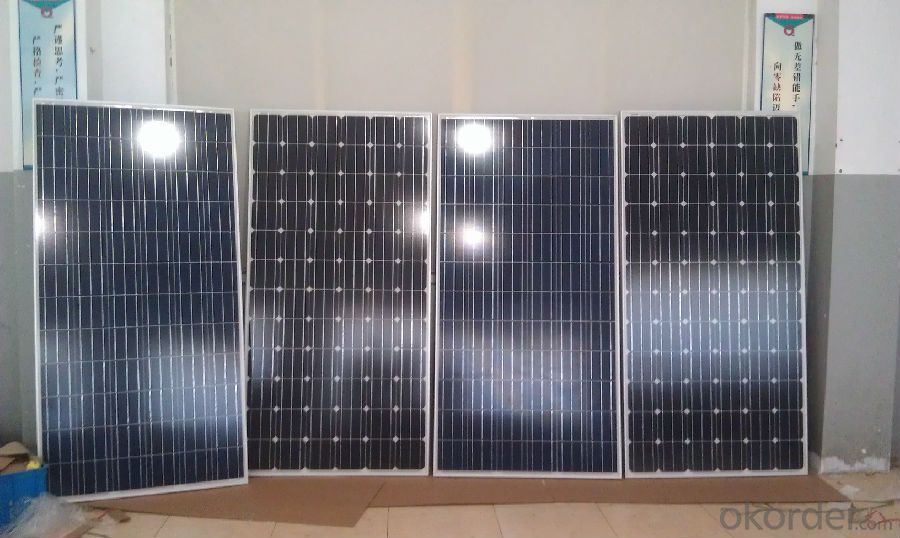
Solar panel working process
In addition to being the ultimate source of all life on earth, the sun is an infinitely renewable, completely pollution-free source of electricity. Instead of burning fossil fuels dug up from the ground in a big power plant – a very 19th century, industrial age approach, when you think about it – solar panels convert sunlight directly into electricity, with no harmful emissions.
Specification of Solar Monocrystalline Series
- Optimal permutation on solar cells to keep enough heat diffusion, decreases hot spot effect.
- High quality and anti-ageing EVA, weather resistance backside raw materials assure reliable solar panels.
- Passed 5400Pa mechanical loads testing by UL, can withstand bad and high mechanical load working environment.
- With good sealed performance, moisture resistant, aging resistance, high/low temperature resistant, the inner terminals of our junction box owns good electrical performance transmission. Bypass diodes used can avoide hot spot effect and damages to panels. Output cables and mating connectors are safe and reliable for installation application. Adopt weather resistance, sealed, good sticky silica gel when assembling.
- Strict quality inspection on each procedure and 100% electrical performance test to meet power requirements.
- 0~+3% power tolerance.
- classification for all the panels in order to improve the integral performance of system and solar panel life span.
- TUV、UL、MCS、CE、ROHS、Golden Sun certified
- Underwriting of 25years output power warranty by The People's Insurance Company of China.
- Q: in a solar panel, i know that the electrons are knocked loose and used as energy, what happens to the protons?
- Here okorder /... Within this structure, the electrons are not really lost from the system. An electron just gets enough energy (from light) to be able to leave its atom, and float freely around the structure. Hence you have electrons in motion, which is the definition of electric current. If the lights go out, the electrons just settle back into one of the atoms that is missing an electron.
- Q: Can solar panels be damaged by birds or other animals?
- Yes, solar panels can be damaged by birds or other animals. Birds may build nests or perch on the panels, causing blockage of sunlight and reducing their efficiency. Additionally, animals like squirrels or raccoons may chew on the wires or cables, leading to electrical damage. To prevent such issues, various measures like installing bird deterrents or using protective mesh can be taken.
- Q: How to make a simple solar panel?
- Guide okorder /
- Q: Do solar panels produce noise?
- No, solar panels do not produce noise as they generate electricity without any moving parts.
- Q: Can solar panels be installed on a sports stadium?
- Yes, solar panels can be installed on a sports stadium.
- Q: looking for a solar panel to charge my laptop on the road, macbook is 60 watt 6.v 3.5a, what should i be looking for in a solar panel?
- an significant questions is what voltage output is the skill grant? what's the wattage while the laptop has been used for hours and then related to the charger with the computing device off? this often is the skill attracted to can charge the batteries. Your answer desires to be waiting to take action skill score. additionally thinking the fashion of Apple skill plug the relationship thoughts would be few. fold-able image voltaic panels + small 2 volt battery + inverter + Apple skill grant or fold-able image voltaic panels + DC to DC regulator for particular Apple computing device DC voltage which contains the recommendations-blowing plug and polarity. Can a internet-e book or pill or clever-telephone meet your vacationing computing desires? all of them use much less skill and could require much less image voltaic kit.
- Q: please no dumb answers and list where you got the info.Also how much does it cost to install solar panels for a regular sized house?
- Short version is that the sunlight knocks electrons loose from a semiconductor panel, and those loose electrons generate an electrical current. The solar panels have lots of cells arranged in series parallel to get to a higher voltage (usually 2 or 24 volts) and current. This is sent to charge batteries under the control of a charge controller. The voltage from the batteries is sent to an inverter that converts the 2/24 volts to 20/240 VAC for household usage. .
- Q: How do solar panels affect satellite dish reception?
- Solar panels can potentially obstruct the satellite dish's line of sight to the satellite, leading to signal interference and reduced reception quality.
- Q: Where can I find the info (sites) that clearly gives the anatomy of a solar panel?Likewise, I want to know where can I find (sites) the solar panel that produces 3.75 v? Thank you very much!!!
- You've probably seen calculators that have solar cells -- calculators that never need batteries, and in some cases don't even have an off button. As long as you have enough light, they seem to work forever. You may have seen larger solar panels -- on emergency road signs or call boxes, on buoys, even in parking lots to power lights. Although these larger panels aren't as common as solar powered calculators, they're out there, and not that hard to spot if you know where to look. There are solar cell arrays on satellites, where they are used to power the electrical systems. You have probably also been hearing about the solar revolution for the last 20 years -- the idea that one day we will all use free electricity from the sun. This is a seductive promise: On a bright, sunny day, the sun shines approximately ,000 watts of energy per square meter of the planet's surface, and if we could collect all of that energy we could easily power our homes and offices for free.
- Q: How many solar panels have ah?
- However, crystalline silicon (monocrystalline silicon and polysilicon) in the weak light is basically no current generation, amorphous silicon weak light type (in low light energy is rarely). So a comprehensive view, it is appropriate to use monocrystalline silicon or polycrystalline silicon solar cell materials. Second, the choice of solar cells 1, we buy solar cells, the focus is on the power of solar cells, in general, the solar panel power is proportional to the area of ??solar chips.
Send your message to us
Chase Solar Panels 250W High Efficiency Solar Panel Poly
- Loading Port:
- Shanghai
- Payment Terms:
- TT OR LC
- Min Order Qty:
- 2600 watt
- Supply Capability:
- 26000 watt/month
OKorder Service Pledge
OKorder Financial Service
Similar products
Hot products
Hot Searches
Related keywords
